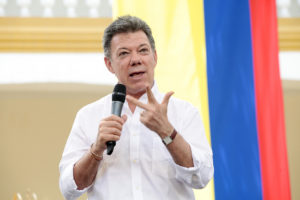Colombian President Accused of Bribery
Colombian President Juan Manuel Santos called for a comprehensive investigation into the accusation that his 2014 reelection campaign accepted a $1 million bribe from the Brazilian construction firm Odebrecht on February 8. The accusation seeks to link the Santos administration with the Odebrecht scandal, a sweeping corruption scandal that spans across twelve countries and three continents. In December 2016, following an investigation by Brazilian, United States, and Swiss authorities, Odebrecht pleaded guilty to corruption charges by paying officials in exchange for contracts. On December 21, the U.S. Department of Justice announced that Odebrecht will pay penalty charges totalling $2.6 billion for its “massive and unparalleled bribery and bid-rigging scheme.”

Odebrecht coordinated the bribery from the very top of the company. According to the BBC, Odebrecht’s executives agreed to assist the investigation into Brazilian petroleum giant Petrobras, whose corruption scandal led to the impeachment of former Brazilian President Dilma Rousseff.
Of the nine Latin American governments implicated in the Odebrecht scandal, Colombian officials received $11.1 million. In January, according to the Colombian newspaper Dinero, a former Transportation Minister of Álvaro Uribe’s administration was arrested for accepting a bribe of $6.5 million. In exchange, he ensured that Odebrecht would win control of an ongoing project to modernize hundreds of miles of Colombian highways.
President Santos requested that the Prosecutor’s Office expedite its investigation into the Odebrecht scandal, stating, “I need to investigate if someone from my government received any money.”
However, ex-Senator Otto Bula, who in January was accused of accepting $4.6 million from Odebrecht, stated in Semana that he helped funnel a bribe to Santos’s 2014 reelection campaign. In his statement, Bula described how he facilitated two separate cash payments of $500,000 from Odebrecht to the campaign.
Santos responded on February 8 with a tweet asking the Colombian Electoral Commission for a “thorough investigation as quickly as possible so that the whole truth about the Odebrecht case can come to light.” The president’s cabinet took a harder line in a statement from the Interior Ministry, declaring Bula “of dubious reputation” and his accusations “absurd and unacceptable,” according to Reuters.
The scandal surrounding Odebrecht’s involvement in the 2014 presidential election does not end with Santos, however. His opponent in 2014, Óscar Iván Zuluaga, also faced accusations that his campaign received multimillion-dollar bribes from Odebrecht through Duda Mendonça, a Brazilian political strategist. While the future of the accusations and the legitimacy of the claims remain unclear, the Colombian government actively voids its current contracts with Odebrecht. According to the Wall Street Journal, the head of Colombia’s national infrastructure agency announced the administration’s intention to work toward “the definitive exit of Odebrecht from Colombia.”
